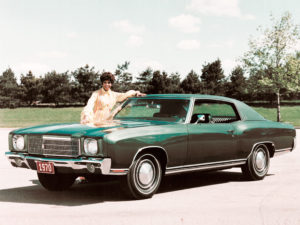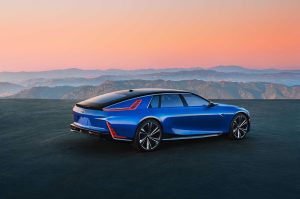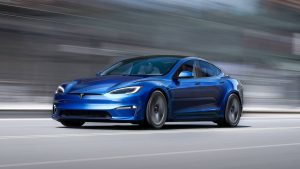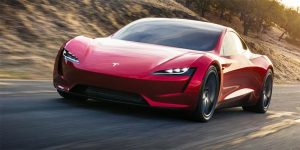Most major automakers have announced plans to shift most or all of their product catalogs to electric vehicles. Each company has a slightly different roadmap, and each has its product plan to get there. As time passes, the scope of EV terminology and definitions to remember grows, so buying a new EV can be a confusing prospect for many people.
Since most of us did not study engineering and have better things to do than research tons of new words before we go shopping, we’ve compiled a list of the most common EV and related terms to help you get started. We’ll update this list as time passes, but we’ll avoid getting into the weeds to make this guide as approachable as possible. We’ve grouped the types of EVs together, but the rest of the EV terminology list is organized alphabetically.

Plug-in hybrid vehicles (PHEV)
Plug-in hybrid vehicles offer an all-electric range on top of the ability to function as a standard hybrid when the battery power is exhausted. The range estimates for even the best PHEVs top out at around 40 miles, but for many people, that could be the difference between stopping for gas occasionally and never stopping at all. Plug-in hybrids require recharging, though, so you won’t get the full benefit of a PHEV powertrain without regular charging. At the same time, PHEVs offer regenerative braking and their charging times are typically much shorter than the time it takes to charge an EV.
Because they have larger batteries and more complex drivetrain components, PHEVs tend to be more expensive than hybrids and gas vehicles. They also don’t offer a significant benefit over regular hybrids if they aren’t charged regularly.

Hybrid Vehicles (HEV)
Hybrid cars have gas and electric motors. They draw power from a small battery that recharges through regenerative braking or by siphoning energy from the gas engine. They offer a fuel economy benefit over traditional gas vehicles because the electric motor handles some of the load typically handled by the gas engine.

Electric Vehicles (EV)
Full electric vehicles require no gas to drive but must be charged regularly. They carry large battery packs and have a limited range. EVs offer many benefits over traditional gas vehicles, including lower regular maintenance costs, no gas, and instant torque off the line. Though many people have focused on range anxiety and the time it takes to charge, the latest EVs offer ranges that outlast many gas vehicles’ tanks and charging times quicker than anyone thought possible just a few years ago.

Fuel Cell Electric Vehicle (FCEV)
Fuel cell EVs use hydrogen fuel to create a reaction that generates electricity, and the only byproduct is water. Because they use hydrogen fuel, FCEVs can refuel as quickly as gas vehicles, making them a compelling alternative for many people. At the same time, however, hydrogen is only available in select markets, severely limiting the ability to buy and drive FCEVs outside of states like California.
EV Charging
There are three levels of EV charging currently in use. Level 1 is the slowest speed and is what you’d see charging an EV using a standard household outlet. Depending on the vehicle, Level 1 speeds can take as long as a few days to recharge an EV’s battery fully. Level 2 is a midrange charging speed many people see at home with professionally installed EV chargers. They use 240V connections and take a few hours to charge. Level 3 chargers can add as much as 20 miles per minute, but their size, expensive, and cost make them impractical for home users. Level 3 chargers are most commonly seen in large public charging stations, and their speeds are sometimes only limited by the EV’s ability to fast charge.

Frunk
The extra space under the hood can be converted to storage without an engine and all the related hardware. Just like your gas car has a trunk, many EVs have a front trunk or frunk. This isn’t the case for every EV, as the new Mercedes-Benz EQS uses its under-hood area to house coolant systems and other vital components.
Internal Combustion Engine (ICE)
Internal combustion engines, or ICE, burn gas or diesel to operate. They combine oxygen, fuel, and a spark to create small explosions that power a vehicle.
EV Range
Range is an estimate of the distance an electric vehicle can travel before needing a charge. Weather, driving style, and other factors can negatively impact range. People say they have “range anxiety” when they worry about the distance they can travel with an EV, but a more significant problem today is charging time, which can extend to half an hour or more to recover any meaningful range.
 Photo courtesy of Tesla
Photo courtesy of Tesla
Regenerative Braking
Electric vehicles and PHEVs can recover the energy from braking and the electric motors and return that to the battery. Depending on the car, regenerative braking may be adjustable or able to be turned off.
EV Tax Incentives
The U.S. federal government has created legislation to incentivize the purchase of EVs and PHEVs. They come in the form of tax credits that the buyer receives at the end of the year. The rules are changing for 2023, but some new EVs may be eligible for thousands of dollars in tax incentives.
Tesla Supercharger
Tesla’s chargers are called Superchargers and can add as much as 80 percent battery to a newer Model S sedan in just 30 minutes. The automaker has historically limited its charging network to its own vehicles, but recent policy changes have opened the network to owners of outside EV brands.

EV Terminology Frequently Asked Questions
Is there such a thing as a solar car?
There are companies working on solar cars, but they currently do not rely solely on solar energy. The Lightyear 0, for example, claims to recover up to 11,000 km (6,800 miles) maximum per year from its solar panels.
Is it a good idea to buy an EV to save money on gas?
Electric vehicles are currently more expensive than comparable gas models, and the difference is large enough that it could take longer than the EV’s lifespan to recoup the extra cost. Gas is expensive, but EVs are also costly, and the payoff isn’t as immediate as many think.
Are EVs zero-emissions vehicles?
Electric vehicles are considered zero-emissions vehicles during operation, but it’s important to note that EV production and much of our current electric grid production require fossil fuels. So, while driving an EV produces no emissions, charging and building one do.

Can I tow with an EV?
Yes! In fact, there are several EVs that offer excellent towing and payload figures. The Ford F-150 Lightning and Rivian R1T are solid electric trucks with stunning capability.
Are EVs safe?
You may have seen news of battery fires and other issues, but the reality is that EV fires and similar problems are less common than in gas vehicles. Automakers are also more likely to include the latest safety and driver assistance features with new EVs to improve the value and attract buyers.

Will gas vehicles be banned?
Some states have announced gas vehicle bans, and the federal government has gotten in on the action, too. The electric reality is coming, and there will be a day (likely in the next 15 years) when we’re no longer able to waltz into a dealership and drive out with a new gas-powered vehicle. At the same time, it’s not like a new sales ban is going to automatically eliminate the millions of gas models on the road today, so we’ll be seeing gas burners for years to come.
Are PHEVs better than EVs?
Plug-in hybrids offer a great middle ground between gas and full electric vehicles because they obliterate the threat of range anxiety. The driver gets a reasonable all-electric range, and when that’s exhausted, they have a normally functioning hybrid vehicle. PHEVs can be great options for people living in areas with sparse EV infrastructure, but their best benefits are only realized with regular charging.
Are EVs self-driving cars?
Despite what you might have heard, there are no self-driving cars on the roads today, and the number will likely remain at zero for quite some time. Many EVs offer semi-autonomous or hands-free driving systems, but they are still limited to select highways, and all of them require the driver to remain attentive at all times.









